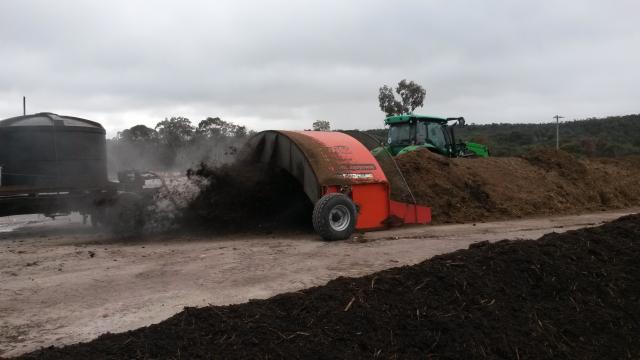
Considering the current trend in soaring fertiliser prices and declining soil health of our farming lands, it might be just the time to look at a way of addressing both.
While composting is an ancient technique, it has largely fallen by the wayside under the lure of quick and easy techno solutions, which while relatively cheap and easy, have shocked complex soil systems into imbalance and decline.
Modern agriculture has mainly focussed on a narrow range of mineral requirements but has overlooked the true cost of maintaining soil health.
Applying a good quality aerobic compost will kickstart your soil rejuvenation, and along with other practices like reducing tillage, looking at alternatives to fumigation, and mixed green cover cropping. Small changes can make a big difference in soil health and plant resilience.
Aerobic composting destroys weed seeds and pathogenic microorganisms and therefore does not carry the risk of spreading animal and plant disease organisms or weed seeds.
A good aerobic compost is alive with microbial life, which is the link between the soil and the plant. This biology delivers the nutrition to the plant, and the higher the microbial life the more efficient the utilisation of minerals from the soil to the plant.
Benefits of compost include:
• Increased soil water retention – an increase of 1 per cent soil organic matter means 170,000 litres extra water per hectare can be stored in the soil.
• Compost delivers nutrition in an immediately plant available form, as well as biology which will continue the process of nutrient cycling within the soil given the right conditions.
• Plants grown with compost show greater resilience to pests and diseases, as well as delivering better nutrition.
• Increase in stable carbon development within the soil – every increase of 1% in soil organic matter binds up 132 tonnes of CO2 in the soil. Composting is arguably the most important efficient delivery of carbon as humus into the soil.
The Granite Belt and surrounds has been fortunate that local Ian Townsend has developed his passion for composting these last few years. Limberlost Compost produces an aerobic compost to Australian Standards, and is composed of two types of manure, two types of sawdust and two types of grasses, magically mixed and tended. It is a ‘green and clean’ product, but even more importantly, alive in the biology that sustains nutrient cycling in the soil.
Ian supplies compost to home gardeners, market gardeners, organic growers and conventional growers alike, and takes the time to explain the importance and process of compost and supporting biological processes.
Limberlost Compost will have a stand at this year’s EcoExpo held at the Ananda Palli Severnlea on Saturday 3 September.
Come and have a yarn with Ian and his team and learn more about how compost and active soil biology can work for you.






